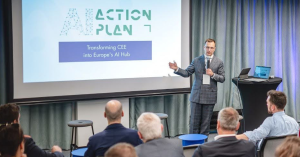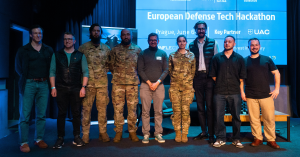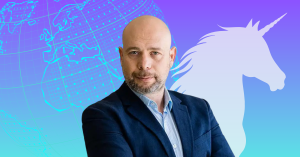Alex Popov strikes you as an open-minded person, with a genuine interest in many different areas and unparalleled dedication to all of them. He has spent the better part of his life in IT. He started his career in Bulgaria working as an engineer for companies like ProSyst and VMware. Later on, he took managerial positions in the Bulgarian offices of 3 unicorns: Kayak, Skyscanner, and Uber. Alex has worked and continues working for the development and growth of the IT ecosystem in Bulgaria. He believes that the country has the potential to build a name for being a place with top IT talent.
Alex retired at the age of 40, but for him, retirement has a different meaning. He has built a portfolio of assets that generates a passive income and gives him financial independence. The former Uber engineering lead remarks on the importance of financial literacy – anyone can achieve the same if they know how to manage their income, invest their money, and think long-term about the future.
Currently, he spends his time delving into a long-lasting passion of his – physics and astronomy, that he had to leave behind 20 years ago to “put bread on the table”. He is taking two master’s degrees in Astronomy at Sofia University but his interests and hobbies go beyond that. In the course of our fascinating conversation, he talks about the value of the domain of software, investing, financial literacy, physics, chasing exoplanets, building self-sustainable farms on the Moon, biology, and even the development of the human brain.
Taller than average, Alex is casually dressed, polite, has kind eyes, and good manners. Despite his accomplishments, he is humble and down-to-earth. He prefers to talk about the success of others rather than his own.

First steps in coding amid a financial crisis
I have always been curious about how our early years shape us as adults and I learned that 2 things are crucial for every kid – to have a specific interest and someone to look up to. In Alex’s case, two very important figures laid the foundations of where he is today. His father was the one that introduced him to computers. Alex had the chance to play computer games at his father’s office back in the days when computers were not as accessible as they are today. At this time for Alex, computers were mostly for fun and he didn’t realize that his father used them for “working on some heavy space tech stuff, and there was a lot of coding there”.
Then a woman close to him showed him that games are just on the surface of what a machine can do.
“This amazing woman one day said: Well if you’re playing for one hour, then you have to code for one hour. And I was like “OK, if that’s the price”, so it started coding forcefully at about 10-11 years.
Later, he went to study software at TUES (Technological School Electronic Systems). This was what “firmed up” his path.
After high school, despite his parents’ disapproval, his passion for physics and science led him to FMI, the Faculty of Physics and Mathematics of Sofia University.
Alex shared that he had always been interested in science and he even wanted to pursue a Ph.D. However, Bulgaria was in a dire financial crisis between 1996 and 2000. The lack of jobs for scientists pushed him back to programming because he “knew how to code and people were looking for coders”.

A servant Leader
A very famous man once said, “be the change you want to see in the world”. This is exactly what Alex managed to do in his career as an IT specialist and team lead in the 3 unicorns he worked for. He led his teams by example and managed to influence the work ethics of the companies he used to work for.
Alex started his career when the “old-school mentality” ruled in the corporate environment. People were managed in a “command-and-control” manner and were looked upon as “brains that need to be enabled”. Those first years in the corporate world even made Alex think that “maybe to build a successful business you just need to be an asshole.”
But he was lucky enough to meet some of the “best mentors in his life” who taught him that there is another spin to managing people.
“As a leader, your job is to enable others – you serve the people that work for you, not the other way around,” says the former Uber engineering lead.
At first, this new mindset shocked him. Even though this approach to interaction with people matched his values and work ethics, he thought that it won’t be long-lived if put into practice. Despite that, he listened to his guts and went with it.
Now, Alex is a strong advocate of servant leadership, having a track record that it works even in environments where this is not the norm. The best example is his time as an Uber engineering lead at the Bulgarian office of the American mobility-as-a-service provider. He had to convince his CTO that he will do things in a different way when recruiting and managing people. His novel leadership approach didn’t have many followers at first, until it did.
“But then they saw that the numbers are going up and that we have that small place in the middle of Eastern Europe that is producing twice as much as Silicon Valley engineers. And they’re not just producing twice as much, they are producing something that is like five-six times their quality. And people were happy, unlike many other sites.”
Alex’s dedication to serving people and lifting them up combined well with his dedication to the development and growth of the Bulgarian IT ecosystem and his belief that Bulgaria can become a country with top IT talent. His work as an Uber engineering lead did exactly that: “When I joined the guys in the US, for example, they used to think that Bulgaria is a cheap, low-quality source of software engineers. When I left this was probably the most elite team of four. ”

Having an open mind helps you learn from anyone
Many people have inspired Alex at different stages of his life. His intention has always been to get the best lessons from them and discard the qualities and traits that he didn’t like about them.
He named “arrogance” as the worst quality one can have, regardless of how smart a person is. Sometimes in a room full of intelligent and experienced people, interns are the ones that ask ¨the stupid questions” and those questions change the direction of the discussion and lead to an amazing discovery, he believes.
As a father, Alex also realized how children can change your perspective and keep you questioning your biases. His transformation into fatherhood triggered the scientist in him and his interest in how the human brain develops from zero.
¨I’m trying to force myself to treat everyone as someone that can teach me something. My kids teach me things from time to time. So, if my mentality was, well, they’re 8 and 13, I wouldn’t have learnt anything from them.¨
Alex added that mentality and self-awareness is very important when communicating with others, because sometimes our biases could prevent us from understanding and learning from their perspective.
His humbleness helps him keep his mind open and he tries to teach others to have the same approach and not cancel someone out before trying to understand their position.
“Take a breath. Count to 10. And ask a question. “
He argued that role models are important not only because of their positives but because of their negative sides as well. There are behaviors and reactions that we wouldn’t want to copy and later repeat. Everything that happens to us is an opportunity to learn and develop.
“We need to squeeze out every bit of experience and turn it into something positive and creative or constructive, rather than criticize people or put them on a pedestal and worship them.”

How to choose the right company
Working for Kayak, Alex realized how complicated the world of business was. He understood what is disruption and how successful fast-growing companies are built. He also came to see that sometimes you can build something amazing and still fail because people just do not understand it.
The second realization that he had was related to the world of investing, especially in the public markets. Back then he treated investing as gambling, something risky and something that just wasn’t interesting for him. But this quickly changed when he realized that there is an actual value behind the conversations about shares and their price. At this point, he started educating himself on how the economy works and how businesses contribute to the bigger picture. Now he wants to pass on his knowledge to the young people that he meets that are just starting their careers: “ Financial literacy is something that I’m trying to make a lot of my young engineers start thinking about and to start investing as early as possible”
“That taught me and made me want to own the company that I work for and I to this day, believe that people who work for a company that they own, or have a very different mentality about how they do their work, because now you’re an owner, and if that company’s value grows twice, you’re actually getting something out of it. You don’t work for the boss or the owner or the investor, you work for yourself”
Another thing that Alex learned is how important everyone is in a company: “It is a well-spread out the myth that the most important piece of a business is software engineers because you’re building a software project No, they are not. You need a bunch of other people with very different skills in very different domains. This is why two software engineers starting a startup are doomed to fail if someone doesn’t teach them that they need someone who knows about financing, someone who knows about marketing, someone who knows how to build a team and someone who knows how to talk to investors.”
This discovery taught him what to look for when choosing his next company. His attention changed from who was giving him the biggest salary to which is the most interesting project. There are other things to look at, especially if you have a family to look after.
“But the next time I picked a company, I picked a company that had an amazing leadership team. I picked a company that was growing steadily. I picked a company that had a vision about where they needed to go, not just amazing engineers. A lot of people are jumping into working for Microsoft, Google, Amazon and Facebook. That probably sits well in your CV, but what value it brings to your welfare and the moment where you can be financially independent. It’s probably another great place. Even to build you up as an engineer or some other kind of professional because many of those companies are already behind the curve.
There are better places to learn how to do software engineering, or define a product or be disruptive for the market, what you’re building, etc. “

We need to break the system
According to Alex “we need to break the system”, referring to the code and the tech services that are under development. In a world full of people trying to be perfect and afraid of making mistakes, he said that people “should be rewarded for making mistakes.”
“When someone comes to me and says, we didn’t break anything for a month, my first thought is, well, there is something that we’re not seeing that isn’t possible like there’s no perfect system. And so I’m worried in those cases rather than happy. When someone comes and says: “Hey, we broke that system five times. We know that it can break for at least another five times in five ways,then I’m happy because I know that we are addressing those things and the system is getting more and more stable. I was shocked when I first saw that approach. But over time you hold their hand, you teach them how the safety nets lead to preventing things from happening unexpectedly. And then you push them a little bit to take that leap and start breaking things.
Now it shouldn’t be done recklessly. And we still serve that end user. If we break something ourselves it will be for like 100 milliseconds. That’s one thing, but if it breaks on its own, it will take hours to restore. “
Alex compares the process of breaking things to the human genome and how nature itself needed millions of years of making mistakes and breaking our genes. It was a matter of probabilities to create a genome that would withstand and survive, and in this process, many unsuccessful attempts and gene combinations have failed.

Beyond the world as we know it
Now, as a retiree, Alex dedicates more time to things that excite him. I was curious to find out more about his hobbies and what sparks up his interest in physics and astronomy
I asked him to explain to me what the exoplanets are as if I were 5. He laughed amused and said, “it is very simple”. He continued to explain that an exoplanet is a planet outside of our Solar system. They exist in other galaxies and orbit their own stars, and some of them are even part of their own entire planetary system. Since exoplanets are made from the same elements as our world and solar system and have the same composition and structure, they often challenge the notion that we are alone in the universe. This is why astrobiologists closely study their size, composition, and location relative to their stars to explore the likelihood of organisms thriving in an environment away from Earth.
Another thing that is on Alex’s mind is the question if he can create his own self-sustainable farms on the Moon. He practices the craft of growing his own plants in his home as he enjoys the process. Then why not try to create the same living conditions for plants to grow in a capsule buried underneath the Moon’s surface? As this is a bit of an unusual idea, he laughed and said “sounds crazy, right” but sometimes we need crazy ideas. History has shown that concepts that sounded absurd led to amazing discoveries and changed our lives for the better.
According to Alex, having the right mindset, knowledge, and support from the people around you, helps you spot life-changing opportunities and make the most out of them.








